Dear Gen Xer,
It’s a hot July night in Sarasota when a man decides to catch a movie. He doesn’t go to see Terminator 2 or The Silence of the Lambs or any of the other mainstream flicks making the rounds in 1991.
Instead, he heads for the South Trail Cinema. On tap that night is a triple bill: Nurse Nancy, Turn Up the Heat, and Catalina Five-O Tiger Shark. What the man doesn’t know is that four detectives in plain clothes are stationed throughout the theater.
William Walters is one of those detectives. He’s worked for the sheriff’s office in Sarasota County for over three years and has seen his share of pervs.
He observes the man for twenty minutes. When the man leaves, Walters follows. He watches the man enter the restroom, waits patiently for him to exit, then places the man under arrest in the theater’s lobby.
The man is charged with violating Florida State Statute 800.03 - Exposure of Sexual Organs. The man says there’s been a mistake. He offers to perform a children’s benefit if Detective Walters drops the charges. Walters doesn’t know what the perv is talking about and proceeds to haul him in. He notes in his report later that night that he saw the man “masterbate” at 8:25 and 8:35 p.m.
The man is processed and his bail is set at $219. He borrows $40 from Deputy Sherriff Joan Verizzo, a friend of his from high school who’s more than happy to help. Verizzo will receive a day’s suspension for breaking department policy.
The man leaves and heads to the airport. He calls his parents, with whom he’d been visiting before going to the movies. He tells them what’s happened, then catches a flight to Nashville, Tennessee, where he seeks the counsel of his sister Abby. She’s a civil rights attorney, a former class president at Princeton University, who also helped establish the Boston University Law Association.
The man speaks to his sister and decides to lay low. He calls his friend, billionaire tobacco heiress Doris Duke, who invites him to stay for as long as he wants at her sprawling estate in New Jersey.
A couple of days later, a beat reporter for the Sarasota Herald-Tribune recognizes a name while scanning the blotter.
He cross-checks the mug shot.
The news explodes.
THE OTHER SHOT HEARD ROUND THE WORLD
What’s Pee-Wee Herman’s favorite team?
The New York Yankees
You heard jokes like this throughout the schoolyard, around the water cooler, and every three seconds on late night TV. One joke I remember referred to The Stroke by Billy Squier.
The Stroke was released in 1981. It was the first single off Don’t Say No, which wound up going triple platinum. The song felt applicable to Pee-Wee’s plight given the suggestive nature of the lyrics: “Do your fancy dances”; “You make my backbone slide”. There’s also the iconic chant: Stroke, Stroke, Stroke, Stroke.
And yet The Stroke has nothing to do with sex. It was inspired, instead, by the music industry; by Squier’s experience with record labels and the godless weasels who work there.
“Plenty of people saw sexual connotations in [‘The Stroke’] but to me, it was about what goes on in the business world.” – Billy Squier
The Stroke is about learning to play the game. About letting the industry stroke you (or shape you) into one of their dancing monkeys.
Better listen now
Said it ain’t no joke
Let your conscience fail ya’
Just do the stroke
While tying The Stroke to Pee-Wee wacking it is quick and easy and super-fun, there’s a far more profound connection at work: the fact that celebrities aren’t real. They’re bigger than life. Carved out of fantasy. So when they’re busted for shoplifting or driving drunk or getting their jollies from a porno flick it renders them vulnerable and far more interesting. By spanking the monkey that night in Sarasota, Reubens upended the quirky but harmless image he’d cultivated. He became too real. Far too human. And the powers who stroked him bristled.
CBS pulled the five remaining reruns they had of Pee-Wee’s Playhouse.
Disney-MGM stopped playing a tape on its studio tour that had Pee-Wee explaining how voice-overs are made.
Toys “R” Us joined in the fun by removing every trace of Pee-Wee merchandise. Luckily, they’d dodged a bullet:
"It's not like something happened with Cabbage Patch. Then we'd have a problem." – Angela Bourdon, spokesperson for Toys "R" Us
November 8, 1991
Reubens entered the courtroom through a side entrance. It wasn’t typically used by defendants, but there was nothing typical about this case.
It didn’t take long, however, for Reubens’ lawyers and Sarasota County prosecutors to reach an agreement. Judge Judy Goldman approved it quickly. Reubens would avoid going to trial in return for a plea of no contest.
A plea of no contest means you accept the charge (and its consequences) but continue to deny your guilt. In the case of the exposure charge levied against Reubens, it would not go on his record.
Under-reported at the time was the fact that Reubens’ innocence had already been established the month before. Videotape taken from a security camera in the lobby of the South Trail Cinema revealed that Reubens was in the lobby during the time Detective Walters claimed to see him “masterbate”. In other words: Pee-Wee wasn’t wacking it.
“The tape had a significant impact, because it throws cold water on the prosecution. Right after the tape was shown to the state, we entered into some serious plea negotiations.” - Ron Dresnick, lawyer for Paul Reubens
Reubens agreed to spend 75 hours of community service making an anti-drug video for TV stations and schools. He also agreed to write, produce, and fund the video, as well as pay an additional $50 fine and $85.75 in court fees.
Reubens avoided reporters as he left the courthouse. His publicity agent, Larry Goldman, read a brief statement announcing his client’s innocence. He refused to answer any questions regarding the future of Reubens’ career.
"A perception about me that I feel is incorrect is that I couldn't work after that. I turned down an awful lot of work, a lot of offers. I just didn't want to work....I mean, I didn't feel that funny.” – Paul Reubens
Reubens laid low for the next ten years, popping up occasionally in movies like Batman Returns (1992), Buffy the Vampire Slayer (1992), The Nightmare Before Christmas (1993), Matilda (1996), Mystery Men (2000), and Blow (2000).
Right around the new millennium, Reubens began to enjoy working again.
“Things were going great. Things were really, really going good. And then they weren't.” – Paul Reubens
November 16, 2001
Reubens is on the set of Elton John’s video This Train Don’t Stop There Anymore when he receives a call informing him that the police are at his house. They’re armed with warrants, the caller says, and they’re going through everything.
The police were acting on a tip they’d received from a seventeen-year-old male. They confiscated Reubens’ personal computers, along with boxes filled with photos. Some of those photos led authorities to the house of Reubens’ close friend, actor Jeffrey Jones.
You remember Jones, don’t you?
Nov. 15, 2002
Reubens turned himself in at the West Hollywood Division station. He admitted to possessing “vintage erotica” – films and magazines with titles like Boy Nudist and Shame Dame – though he vehemently denied the charge of pornography.
“[The photos were] really camp, kitschy, funny stuff from the ’40s, ’50s, or ’60s. …Ninety percent of anybody off the street who looked at the stuff would burst out laughing and say, ‘You're kidding me'. " – Paul Reubens
Reubens was processed and released on $20,000 bail.
Jeffrey Jones, meanwhile, was charged with enticing a 17-year-old male - the same teenager who’d served as witness the year before - to pose for sexually explicit photos. Jones was also charged with possession of child pornography.
Jones pled no contest. He was sentenced to five years’ probation and ordered to register as a sex offender. Mandatory counselling was part of the deal.
Reubens’ case continued.
Word leaked at one point that police had found a home video of teenage boys engaging in sexual acts. That turned out to be false, however. Apparently, there’d been a mix-up in the L.A.P.D.’s evidence room.
The D.A.’s office eventually determined that the material seized from Reubens’ home did not warrant a felony prosecution. The case was bounced to the L.A. city attorney’s office, who charged Reubens with “misdemeanor possession of material depicting a child under the age of 18 engaged in sexual conduct as defined by California state law.”
“I am glad the prosecutors finally dismissed the child pornography charge without me or the taxpayers having to pay for a costly circus-like trial. I am disappointed any part of my art collection was ever deemed inappropriate. Taking responsibility by calling a few images in this collection 'obscene' and paying a $100 fine seemed like the sanest way to make it end." – Paul Reubens
Reubens did an interview with NBC News after the case was settled.
Here are some relevant snippets:
Did you ever stop and think while you were massing this collection, maybe it's not such a good idea, especially given what had happened back in 1991?
Reubens: “I didn't. I never did. I wasn't really thinking to myself, wow this is my creepy, weird stuff that I shouldn't be collecting. It's not titillating. It's not something that I use for any kind of sexual purpose.”
…
I mean, were there photographs of young men, boys, underage people, performing, masturbating?
Reubens: “No. Absolutely not. One hundred percent not.”
So what are they referring to when they describe it that way?
Reubens: “One photograph for example has a young man with his hand on his thigh. It is close to his genitals, but not even that close. That's what they're calling somebody getting ready to perform a sex act.”
…
If you're secure in your belief that this was art, nothing illegal, why not let a jury look at the evidence? Why settle?
Reubens: “Personally, I think we're living in a very scary time. Do we let the legal system decide in a courtroom what's obscene and what's not obscene? I didn't want be in a situation where there was a possibility I could got to jail for something that's that material. I mean, that just seemed insane to me.”
…
Are you someone who needs to be supervised with children?
Reubens: “No. I don't think so. I don't think I've ever led my life in that way, ever. One thing I want to make very, very clear, I don't want anyone for one second to think that I am titillated by images of children. It's not me. You can say lots of things about me. And you might. The public may think I'm weird. They may think I'm crazy or anything that anyone wants to think about me. That's all fine. As long as one of the things you're not thinking about me is that I'm a pedophile. Because that's not true.”
Paul Reubens died of cancer on July 30, 2023. He was 70 years old.
The news came as a shock to fans who had no idea that Reubens was sick. Reubens had kept his illness a secret, unwilling to burden the public with his suffering. He bid the world adieu with a message on Instagram:
Three and a half decades have passed since that night in Sarasota. Despite the evidence that Reubens didn’t expose himself, as well as his innocence regarding the possession of child pornography, the actor’s legacy remains tarnished.
The jokes continue; they’ll always continue. And the stigma has stuck for good. Pee-Wee wacked it, even if he didn’t. Pee-Wee was a pedo, even if he wasn’t.
All these years later, The Stroke by Billy Squier still rings true:
Don't ya' take no chances
Keep your eye on top
Do your fancy dances
You can't stop
Reubens didn’t dance the way the world wanted him to. Or at least how sponsors wanted him to, who are the only people showbiz listens to.
Reubens made the mistake of being human. Of living a life outside the confines of his red bowtie and gray suit.
“He lives with it every day. It’s affected everything he does. It haunts him. How could it not?” - William H. Macy, actor and friend of Reubens
Perhaps Reubens was right to maintain a low profile. To keep his nose (among other extremities) out of the spotlight and away from the media, which had hurt him so badly over the years.
Still.
I wish just once Reubens had stood up to the hacks in the press and on television, who inflated their readership and their ratings by labeling him a perv. I wish he’d dismissed those hypocrites and bullies with the irritating line that had made him famous:
I know you are but what am I?

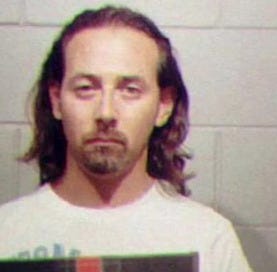


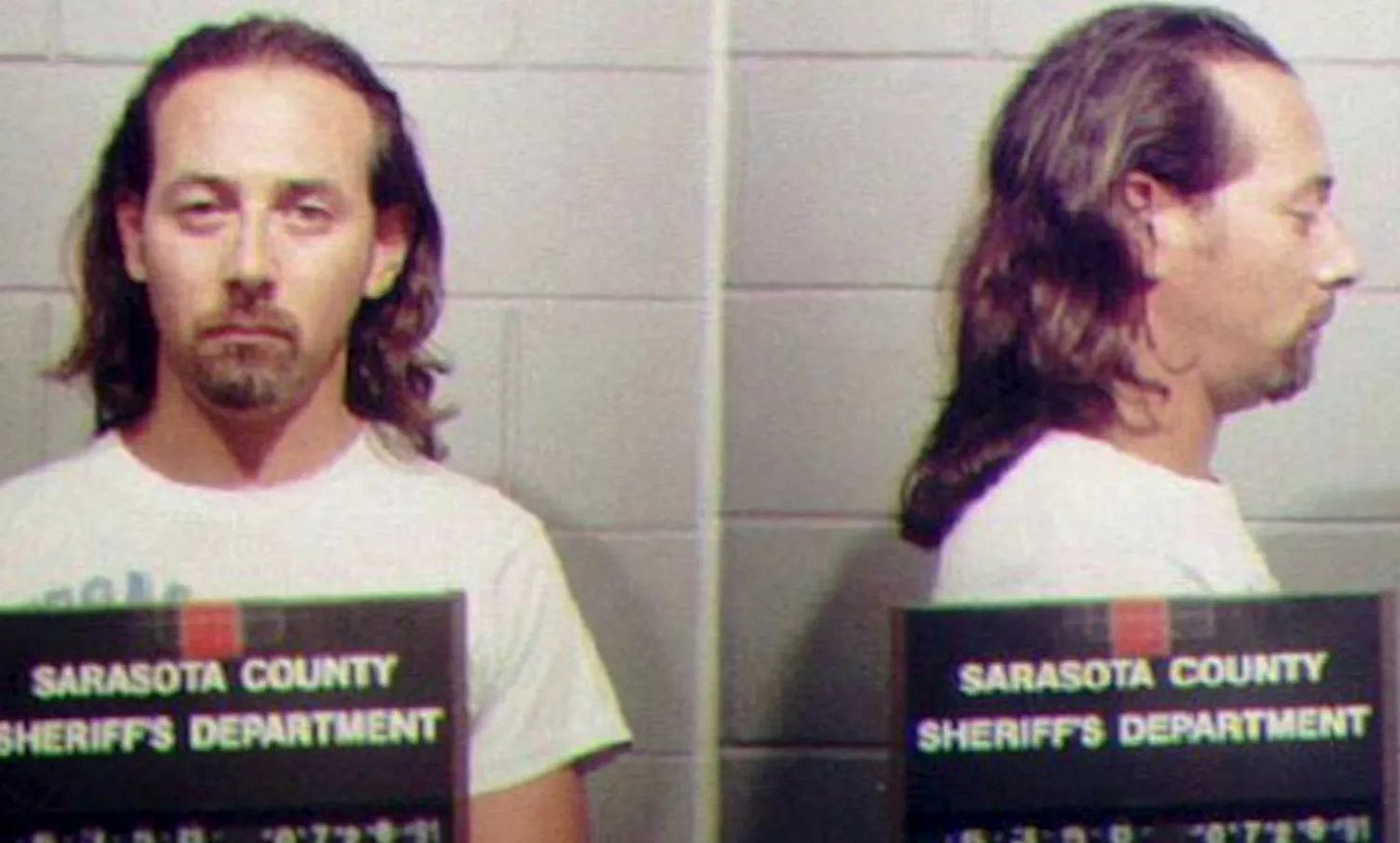
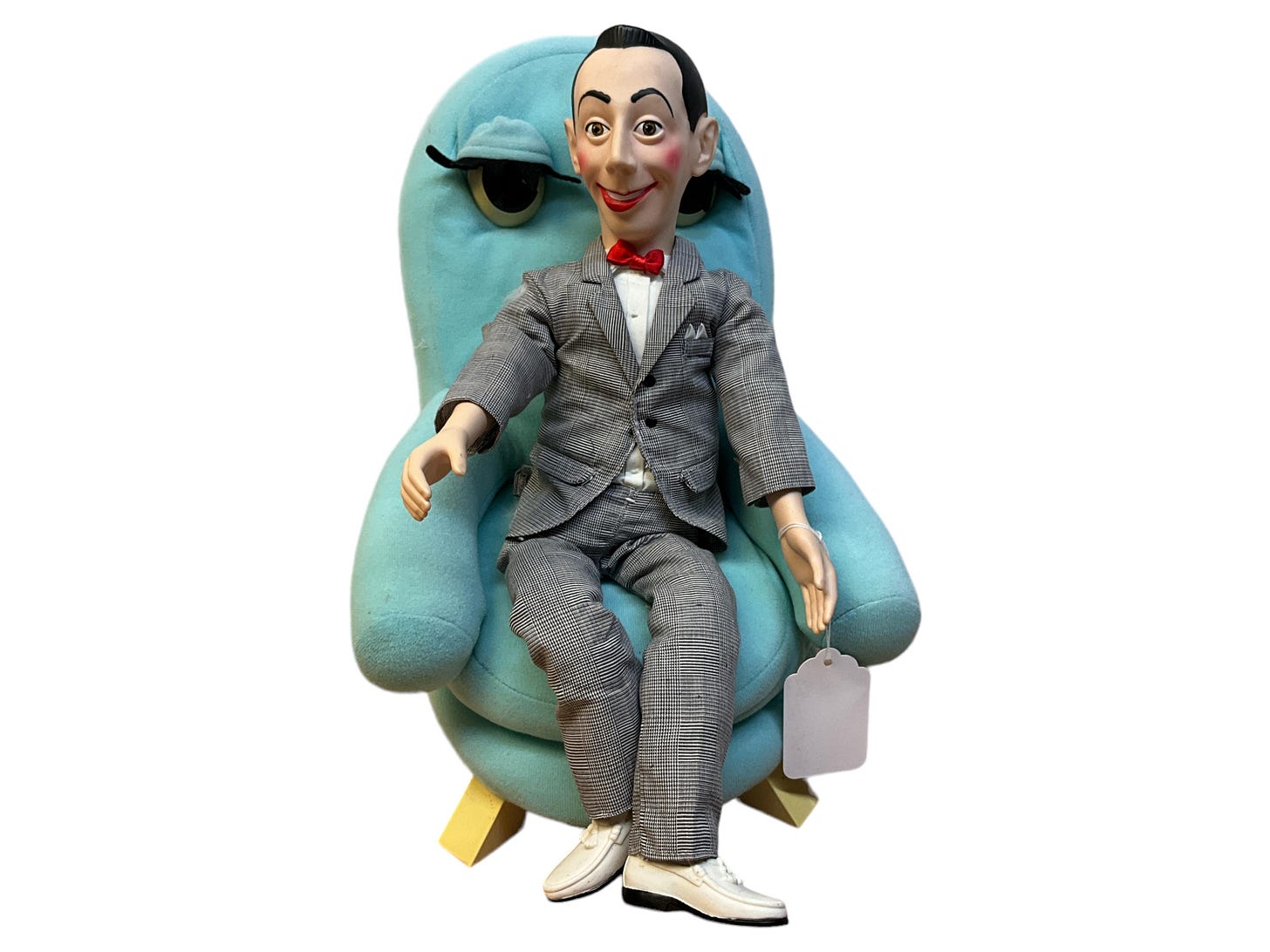
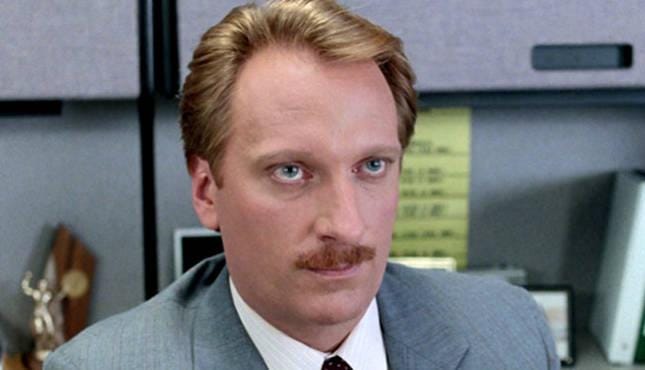
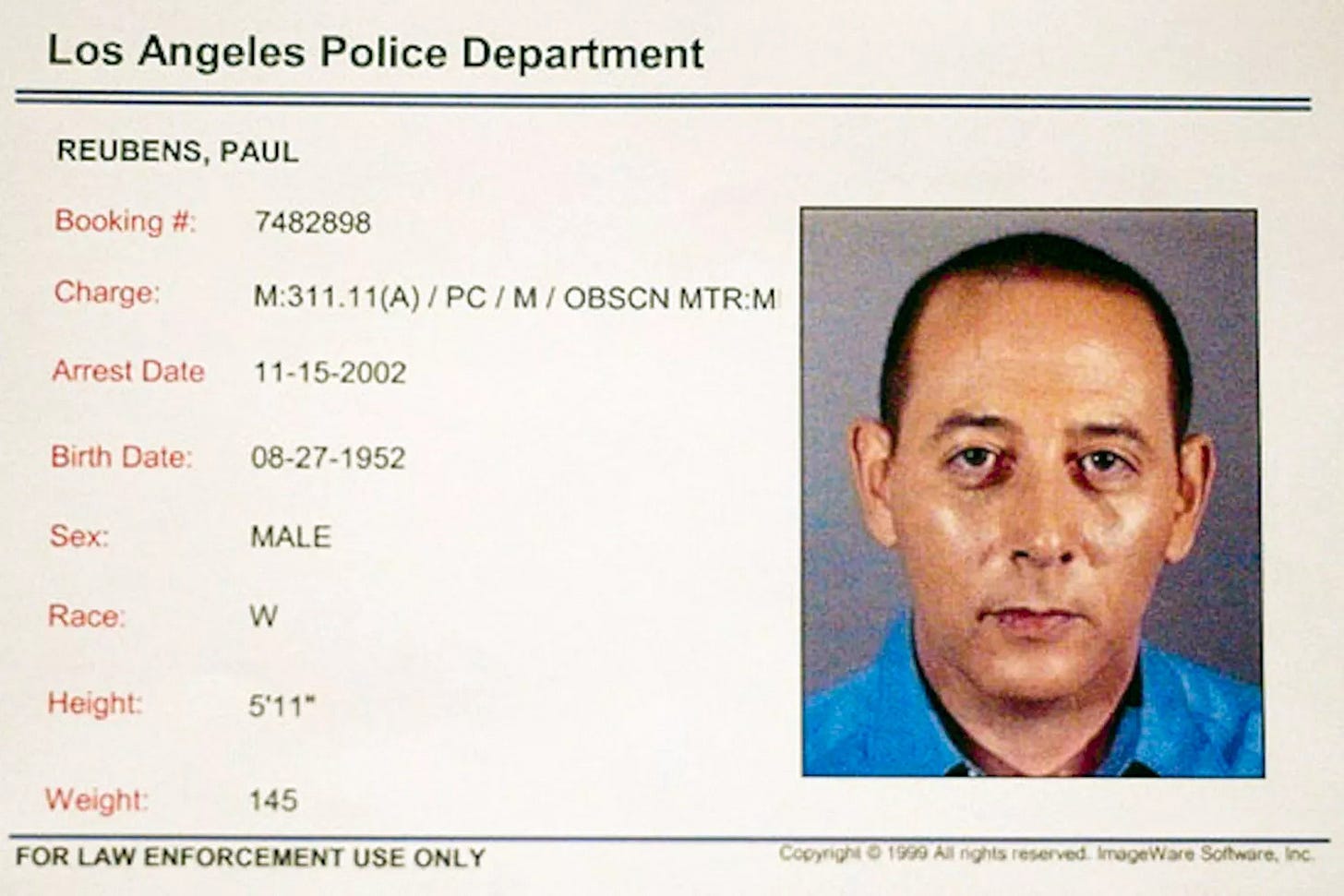
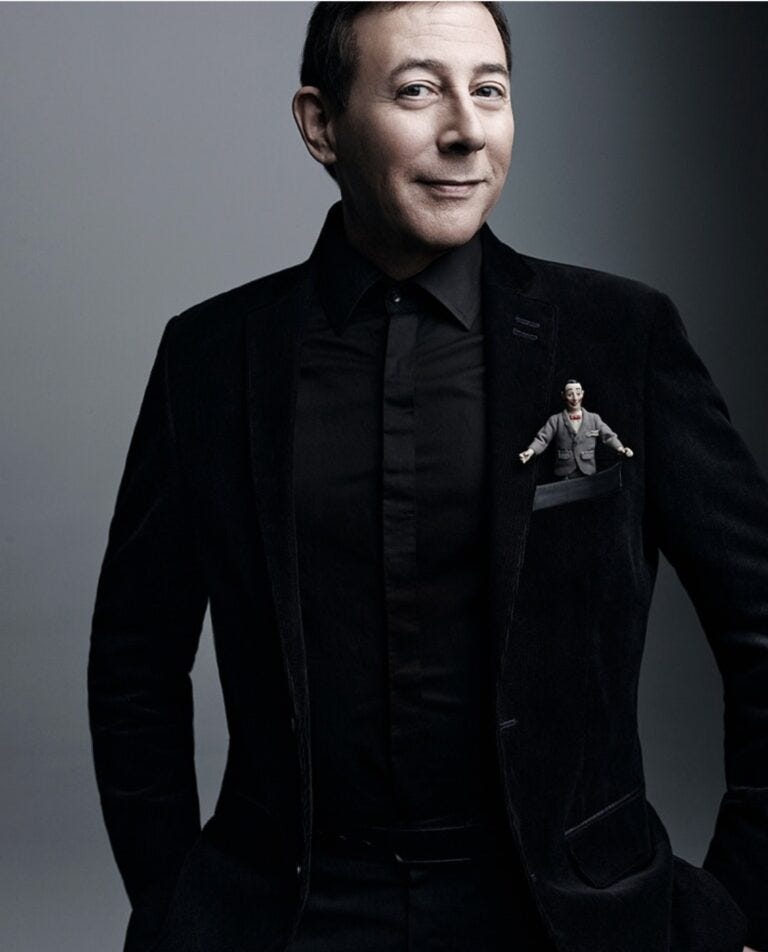
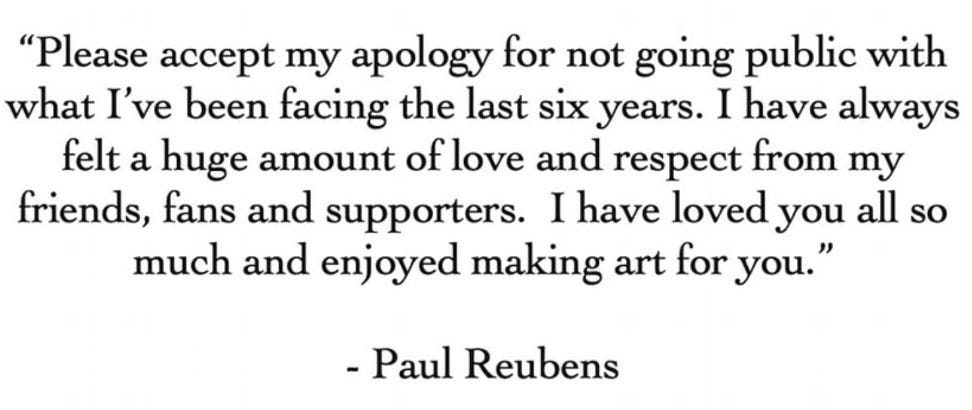
"Heard any good jokes lately?!"
-Paul Reubens - MTV Music Awards 1991
There are a lot of different levels to this piece. First, you did a great job of researching and documenting. Along with the press you can throw in the police departments involved who were so hungry for a narrative they were sloppy. Not much has changed there I’m afraid.
Pee Wee was a regular fixture of the LA scene during the 80s. I think he was part of DL Roth’s crew. The music and movie scenes sort of co mingled. I used to see him around different parties. Unfortunately, as you describe, he never recovered from the perceptions.
You could have done a complete piece on Billy Squier. His story is pretty sad as well. As you said, he had the huge hit and was riding high. He went out on a huge tour. The group opening for him was a up and coming group called Def Lepard. This was just prior to the release of Pyromania. They were rocketing in popularity and by the time the tour was a few dates old they had surpassed Billy. The fans were pissed because DL was the opener and took it out on Billy. After that his record company and management couldn’t decide what they wanted him to be. They put out some photos of him that made him look gay, and that was the beginning of the end. It was too bad because he had the chops. He was much better than where he got projected.
I enjoyed this as always. I never know where your “way back “ machine is going to take me.